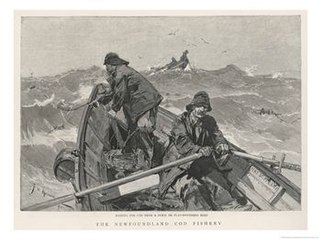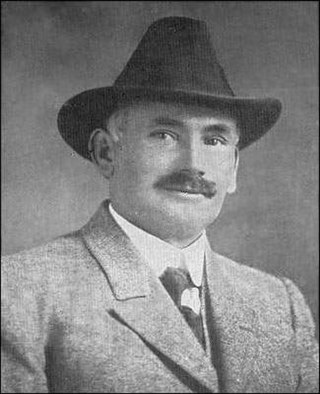Related Research Articles
The Newfoundland People's Party was a political party in the Dominion of Newfoundland before it joined Canada.

Bacalhau is the Portuguese word for cod and—in a culinary context—dried and salted cod. Fresh (unsalted) cod is referred to as bacalhau fresco.

An outport is the term given for a small coastal community in the Canadian province of Newfoundland and Labrador other than the chief port of St. John's. Originally, the term was used for coastal communities on the island of Newfoundland, but the term has now been adopted for those on the mainland area of Labrador as well.

Gazela is a wooden tall ship, built in 1901, whose home port is Philadelphia. She was built as a commercial fishing vessel, and used in that capacity for more than sixty years. She now serves as the maritime goodwill ambassador for the City of Philadelphia, the Commonwealth of Pennsylvania, and the Ports of Philadelphia and Camden, New Jersey. She has been featured in a number of films, and participated in domestic and international events, including OpSail 2000.

A fish flake is a platform built on poles and spread with boughs for drying cod on the foreshores of fishing villages and small coastal towns in Newfoundland and Nordic countries. Spelling variations for fish flake in Newfoundland include flek, fleyke, fleake, flaik and fleack. The term's first recorded use in connection with fishing appeared in Richard Whitbourne's book Newfoundland. In Norway, a flake is known as a hjell.
The Burin Peninsula is a peninsula located on the south coast of the island of Newfoundland in the province of Newfoundland and Labrador. Marystown is the largest population centre on the peninsula.
The history of Saint Pierre and Miquelon is one of early settlement by Europeans taking advantage of the rich fishing grounds near Saint-Pierre and Miquelon, and is characterized by periods of conflict between the French and British.
Triton is a town that lies on Big Triton Island just off the coast of northeastern Newfoundland, in the Canadian province of Newfoundland and Labrador. Triton is the economic center of Green Bay South. According to Statistics Canada, Triton's population fell from 983 in 2016 to 896 in 2021. The town of Triton has seen growth in recent years, with new businesses and buildings opening in 2017. Triton also has a state of the art swimming pool, skatepark and a small basketball court; there are also trailer campsites near the community.

The province of Newfoundland and Labrador covers the period from habitation by Archaic peoples thousands of years ago to the present day.
Herring Neck is a local service district and designated place in the Canadian province of Newfoundland and Labrador. It is on the northeastern extremity of New World Island, Notre Dame Bay. The community encompasses several small contiguous communities such as Merritt's Harbour, Hatchet Harbour, Salt Harbour, and Sunnyside. The name has changed many times in its history; at one time the area now called Herring Neck was called Goshen's Arm and the areas now called Pike's Arm and Green Cove was called Herring Neck.
The Fish, Food and Allied Workers (FFAW) Union is a trade union in Newfoundland and Labrador that represents 15,000 workers. Most of the members are in the fishing industry but the FFAW also has organized workers in the hotel, hospitality, brewing, metal fabrication, window manufacturing and oil industries in the province. The FFAW is the largest private sector union in Newfoundland and is affiliated with Unifor.

Pomor trade, is the trade carried out between the Pomors of Northwest Russia and the people along the coast of Northern Norway, as far south as Bodø. The trade went on from 1740 until the Russian revolution in 1917.

The Fishermen's Protective Union was a workers' organisation and political party in the Dominion of Newfoundland. The development of the FPU mirrored that of the United Farmers movement in parts of Canada.

Cod fishing in Newfoundland was carried out at a subsistence level for centuries, but large scale fishing began shortly after the European arrival in the North American continent in 1492, with the waters being found to be preternaturally plentiful, and ended after intense overfishing with the collapse of the fisheries in 1992.

Cod fisheries are fisheries for cod. Cod is the common name for fish of the genus Gadus, belonging to the family Gadidae, and this article is confined to three species that belong to this genus: the Atlantic cod, the Pacific cod and the Greenland cod. Although there is a fourth species of the cod genus Gadus, Alaska pollock, it is commonly not called cod and therefore currently not covered here.

Sir William Ford Coaker was a Newfoundland union leader and politician and founder of the Fisherman's Protective Union, the Fishermen's Union Trading Co., and the town of Port Union. A polarizing figure in Newfoundland politics and society, he was described as "the outstanding social reformer produced by Britain's Oldest Colony" by eventual Premier Joey Smallwood.
The 1919 Newfoundland general election was held on 3 November 1919 to elect members of the 24th General Assembly of Newfoundland in the Dominion of Newfoundland. The Liberal Reform Party, an alliance between the Liberals led by Richard Squires and the Fishermen's Protective Union of William Coaker, formed the government. The People's Party, became the Liberal-Labour-Progressive party following the election and formed the opposition. Squires served as Newfoundland prime minister.

Job Brothers & Co., Limited was a Colony of Newfoundland-based mercantile empire that spanned three centuries. The main business of the company centered on production and development of fisheries rather than trading. The Job Brothers & Co., Limited letterhead, however, self describes the company as "steamship owners, general merchants, agents, and importers" as well as "exporters of dried cod fish, herring, salmon, lobsters, seal skins, whalebone fertilizers, cod oil, medicinal cod liver oil, seal and whale oil". As president of Job's Brothers, Hazen Russell had the company's vessel, Blue Peter, outfitted as the first floating, frozen-fish processing factory in the world.
Bernard Martin is a Canadian fisherman and environmentalist. He was awarded the Goldman Prize in 1999.
Caplin Cove-Southport is a local service district and designated place in Trinity Bay in the Canadian province of Newfoundland and Labrador. Caplin Cove-Southport is approximately 50 km from Clarenville.
References
- 1 2 3 4 Encyclopedia of Newfoundland and Labrador , Volume two, page 187